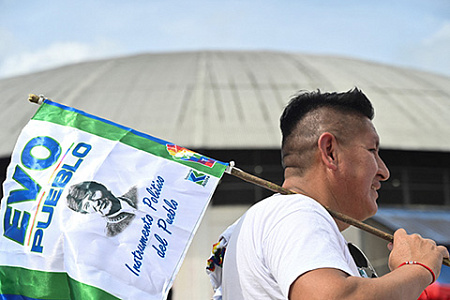
Bolivia is on the brink of a major political transformation as it heads to the polls for general elections on August 17. A bitter power struggle within the ruling Movement Towards Socialism (MAS) party has shattered the left’s unity, potentially ending its long-standing grip on power and heralding a significant shift in the nation’s foreign policy.
The core of the crisis lies in the schism between current President Luis Arce and his mentor, former President Evo Morales. Once allies, their relationship fractured after Arce’s 2020 election victory, as Morales returned from exile and sought to reassert control over the party. This internal conflict has escalated dramatically, with Morales attempting to run for president again despite a constitutional ban, leading to street protests and clashes with police.
In a stunning turn of events, the government has responded by filing criminal charges against Morales for incitement and obstructing the electoral process. The former leader is now reportedly taking refuge in his political stronghold of Chapare, with prosecutors suggesting a conviction and potential prison sentence are likely by the end of the year. The political turmoil has cratered President Arce’s popularity, forcing him to abandon a re-election bid and instead support a little-known proxy candidate, Eduardo del Castillo, who is polling at a dismal 2%.
This implosion on the left has created a clear opening for a resurgent right and center-right opposition. Polls indicate that a runoff election is almost certain, with the frontrunners being business magnate Samuel Doria Medina and former President Jorge “Tuto” Quiroga, both of whom are polling above 20%. They, along with another right-wing candidate, Manfred Reyes Villa, are poised to battle for the presidency in a likely second round on October 19.
The international stakes of this election are profound. The leading opposition candidates have unanimously declared their intention to pivot Bolivia’s foreign policy sharply towards the West. Promises include normalizing relations with the United States and Israel and, most critically, reviewing all major lithium contracts signed by Arce’s government, including lucrative deals with China and Russia. This signals a potential realignment of Bolivia, home to some of the world’s largest lithium reserves, away from its recent partners and toward Western corporations and governments.
As Bolivians prepare to vote, the election is seen as a watershed moment. The self-inflicted wounds of the ruling party’s internal war have not only derailed President Arce’s economic agenda but have also set the stage for a new political era, one that could profoundly reshape Bolivia’s place on the global stage.
